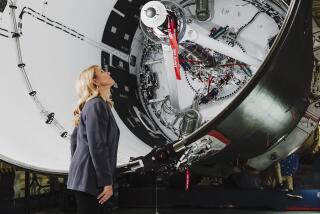Rockwell and Russian Firm Teaming Up : Aerospace: Companies to cooperate on space projects, including use of Soyuz as rescue craft for space station Freedom.
- Share via
SEAL BEACH — Aerospace giant Rockwell International Corp. said Tuesday that it has signed a letter of understanding with a major Russian aerospace company to cooperate on several space-related projects, including a plan to use the Soyuz spacecraft as a rescue vehicle for space station Freedom.
Under the terms of the agreement, signed late Friday, Russia’s NPO Energiya will provide Rockwell with all the engineering work and eventually add some hardware for a space docking system to enable the U.S. orbiter to dock at Russia’s Mir space station. In turn, Rockwell will purchase engineering data on spacecraft performance from the Russian company, which builds the Soyuz spacecraft.
The two companies will also start discussions with National Aeronautics and Space Administration on the feasibility of using the Soyuz TM spacecraft as an interim vehicle to assure the return of the space station Freedom crew in case of emergency. The space station is not expected to be occupied permanently until after 1999.
The two companies also plan to study cooperative ventures for long-term manned missions to the moon and to Mars. Such joint efforts would cut costs for Rockwell and NPO Energiya at a time when financing for space projects is shrinking, said Yury P. Semenov, NPO Energiya’s general director, who is leading a five-member delegation of Russian scientists and officials now visiting U.S. aerospace companies.
Semenov, who spent Friday touring various Rockwell facilities in Southern California, including its Seal Beach headquarters, said the pact will help the two companies avoid duplication of projects and efforts.
The agreement comes nearly two weeks after a Rockwell rival, Lockheed Missiles and Space Co. in Sunnyvale, Calif., signed a broad agreement with NPO Energiya, which is based in Kaliningrad, a major port city 680 miles west of Moscow. That pact, the first such space industry agreement between the United States and Russia since the 1970s, was signed just seven weeks after NASA officials opened talks with their Russian counterparts about a wide range of joint aerospace projects.
Donald R. Beall, Rockwell’s chairman and chief executive, said that his company will be bringing Russian scientists and engineers to work at Rockwell facilities in California. The two companies plan to establish a technical working group to identify future projects and a business group that would negotiate contracting, pricing and payment policies for products resulting from joint efforts.
The two aerospace companies are also discussing ways to develop space technology, including research on materials that would withstand high temperatures and could be used in high-speed aircraft and spacecraft.
“We’re setting up the capability to manage various research activities with them,” Beall said of the Russians. “Business ventures of this kind will represent an important facet of our expanding international business.”
That international business already accounts for about $3 billion in annual sales for Rockwell, or 25% of its total revenue. Beall predicted that the foreign market will provide significant growth for the company in the 1990s.
Analysts say that similar aerospace ventures between the two countries will likely become more common. While they applaud such projects as a boost for U.S. space technology, they noted that they do not necessarily bode well for U.S. aerospace workers, many of whom have already lost their jobs during the recession.
“The more the U.S. becomes involved with the Russian space station, the less likely that funding will be provided by Congress for the U.S. space station,” said Lawrence M. Harris, a vice president and aerospace industry analyst at Kemper Securities Inc. in Chicago.
“There would be a negative impact on employment in Southern California if funding for the U.S. space station is cut back as a result of this U.S.-Russian venture,” he said.
Among companies that could be affected, Harris said, are McDonnell Douglas Space Systems in Huntington Beach, which is the lead contractor in the space station project; Rockwell’s Rocketdyne division in Canoga Park, which supplies the power system for the space station, and Boeing Aerospace, which is building the space station modules in Huntsville, Ala.
Jack Modzelewski, a defense and aerospace analyst at PaineWebber Inc. in New York, said that he expects to see more deals between U.S. and Russian aerospace companies in the next two years as a result of a hard-currency crunch in the former Soviet republic.
“You’ll see more deals like bartering. Russia will be able to say they’ll provide a part of its space technology to the U.S. in exchange for goods and services they need for their space and commercial aircraft programs,” Modzelewski said Tuesday.
Indeed, U.S. companies have started to tap into Russian technical know-how since the demise of the Soviet Union. Last month, Boeing Co. in Seattle said it will hire Russian scientists and engineers at a new research center it plans to open in Moscow.
More to Read
Inside the business of entertainment
The Wide Shot brings you news, analysis and insights on everything from streaming wars to production — and what it all means for the future.
You may occasionally receive promotional content from the Los Angeles Times.










